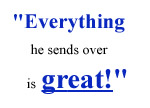 Monsanto employee Norma Curby participates in a Project Business class at Hazelwood West Junior High School.
Monsanto employee Norma Curby participates in a Project Business class at Hazelwood West Junior High School.

JUNIOR ACHIEVEMENT
PROGRAM TEACHES
BASICS OF ECONOMICS
M.J. ZIEGLER
(314) 694-8144
NEWS FOR RELEASE IMMEDIATELY
ST. LOUIS, May 31 - The earnest young "dentist," a participant in the Project Business program, offered reasons why she should be allowed to stay on earth.
"I have to stay so people can have checkups and won't lose their teeth," said Leah Canada of Hazelwood, Mo. "That way, they'll be able to eat."
Said the "clergyman," alias Erika Perkins of Hazelwood, "I need to be here to save people's souls, so they have someone to talk to."
These enterprisingly clever pleas by students at Hazelwood West Junior High School were all part of a role-playing exercise conducted by Norma Curby, a supervisor of structural design engineering at Monsanto Company, who participated in Project Business, an extension of the well-known Junior Achievement (JA) program.
The students were given a scenario in which a world disaster had occurred, and due to inadequate supplies only a few people would be allowed to stay on earth, with the remainder to be banished to Mars. Since only one person of selected professions would be left behind, the students had to explain why they should remain on earth to rebuild civilization.
"The purpose of the exercise is to get the kids thinking about different career fields and how they help society," says Ms. Curby. "This exposure gives them a better idea of how the business world works."
Exercises such as this are what Project Business is all about. Students enroll in a social sciences course such as English or geography and participate in normal classroom activities four days a week. Volunteers from corporations or businesses lecture the classes on economic topics the other day, employing a variety of activities including audio-visual aids, gamesplaying and field trips.
Local JA officials began the Project Business program seven years ago to try to overcome what surveys showed were negative perceptions of American business by St. Louis-area junior high school students. In that seven-year period, the program has grown from 253 participants to 10,000 students in 400 classes per school year, and hopes to add 100 classes per year in the future.
The program results in dramatic changes in attitude over the course of a semester. In tests taken the first week of the course, kids perceive businessmen as "making tons of money" as they "ripoff" the public. By the third week's test, students characterize businessmen as "hard working" and "dedicated to the profit motive."
Both students and teachers say they like Project Business because it brings something different to the classroom.
"It's fun," says Kris. "We get to do a lot of neat things and go places."
"I love the program," says Dennis McFarland, teacher of the class Ms. Curby lectures on Wednesdays. "I could stand up here all day long. But when you bring an expert in, that lends more to it. The students are more impressed."
Randy Spear, a planning manager for Monsanto Industrial Chemicals Company, is another regular volunteer in Project Business, teaching a class of eighth graders at Hoech Junior High School. During a recent session, Mr. Spear and Don Hughes, a personnel and development director at Monsanto, discussed factors such as personal life values, skills and traits that influence a person's decision of which career to pursue.
"The kids really feel good about the class," says Carolyn Wilson, course instructor. "This program draws the class out and gets the students more involved. You get more of a chance to see the interests of the kids."
Robert Burke, group vice president and managing director of Monsanto Fibers and Intermediates Company, and himself a JA board member, says the in-school segment will be the fastest-growing area of JA in the future.
"The enthusiasm these programs spark in the school children does not just smolder there -- it also flames the imaginations of their teachers and parents," says Mr. Burke. "Not only do these programs leave them all more literate economically, but they also improve their attitudes towards business as their understanding increases."
These aren't the only Monsanto personnel involved in Project Business, nor is Monsanto's involvement in JA limited to just this one program.
For example, a total of 30 Monsanto volunteers lend their time to Project Business, while others assist in the other in-school program, Applied Economics. Many employees assist in the more traditional JA program where students make products, form corporations and compete among each other. In addition, Monsanto contributed $30,000 to JA in 1983, and employees each year help raise additional funds to keep the organization going.
"The rewarding thing to me is to see the kids who didn't participate at first really getting into it now," says Mr. Spear. "That's what makes me feel good."
# # #





